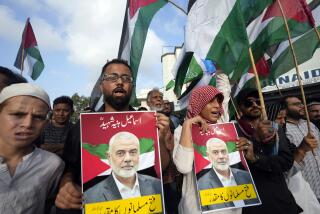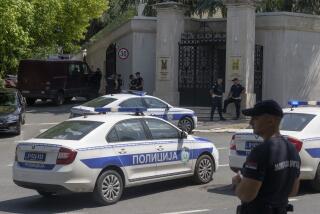Jordan Hunts U.S. Envoy’s Killer
- Share via
AMMAN, Jordan — Officials said Monday that they would focus on Islamic extremist groups known to be operating in Jordan as they began hunting those responsible for the slaying of an American diplomat who was gunned down outside his home here.
Laurence Foley, a 60-year-old employee of the U.S. Agency for International Development, was struck by at least seven bullets in the head and torso as he was about to step into his car, parked in his gated driveway in a quiet, affluent neighborhood. His wife, Virginia, who was home at the time of the early morning shooting, told officials that she saw a man whose face was masked by a kaffiyeh headdress fleeing on foot.
The killing came at a time of rising tensions in the Arab world due to the United States’ support of Israel and possible military action against Iraq.
Jordan is considered one of the region’s most stable states and is also one of America’s closest allies in the Arab world. However, it has strong cultural and commercial ties to neighboring Iraq, and there is considerable public opposition here to aiding the United States in any strike against Iraqi President Saddam Hussein.
Security surrounding American diplomatic personnel and other foreign envoys in Amman was heightened in the wake of the shooting. Diplomatic vehicles were seen moving about the capital under the escort of Jordanian special forces in jeeps with mounted machine guns.
The U.S. Embassy urged American citizens in Jordan to be vigilant, but Ambassador Edward W. Gnehm Jr. declined to discuss specific measures. Jordan is home to about 9,000 U.S. citizens, many with dual Jordanian and American citizenship. Gnehm noted that the U.S. State Department has referred repeatedly to “the concerns we face in this region.”
Last month, 10 men were detained in connection with an alleged plot to kidnap U.S. Embassy employees in Amman as they were out jogging.
A number of militant Islamic groups have had a well-established presence in Jordan. Osama bin Laden has fired the imaginations of many young men here, and substantial numbers of Jordanians were among those who spent time at his Al Qaeda terrorist training camps in Afghanistan.
One U.S. official in Washington speculated that the assassination might have been the work of the Al Qaeda network, in part because of the prior threat of kidnapping.
“There are some pretty clear indications that the network is now more active in Jordan,” said the official, who spoke on condition of anonymity. But there has been no recent or specific intelligence about Al Qaeda going after embassy or USAID personnel, he said. U.S. officials added that so far, they had seen no links to Iraq.
A leading Al Qaeda activist known as Abu Qatada, who was arrested in London last week, is a Jordanian of Palestinian extraction. More than half of Jordan’s population is Palestinian, and authorities say they wage a constant battle to prevent militant Palestinian groups from using the kingdom as a staging ground for infiltration into Israel and the West Bank. The Jordanian government has cracked down hard on groups it considers a threat.
The militant Islamic group Hamas made Jordan a key regional base until most of its members were expelled after the ascension of King Abdullah II in 1999.
Also in 1999, authorities broke up a so-called millennium plot to attack Israelis and Americans at hotels and tourist sites in Jordan.
At the sprawling, fortress-like U.S. Embassy in Amman, hundreds of employees gathered for a “very somber, very sad” meeting hours after the attack, said press spokesman Justin Siberell. Foley, a onetime Peace Corps volunteer who spent his career working in aid and development projects, was remembered as a warm and openhearted colleague.
“We’re all simply devastated,” Gnehm told journalists, his voice cracking. “We’re outraged by this incomprehensible act. There can be no possible explanation for a heinous act of this kind.”
The ambassador called those behind the killing “cowardly and evil,” pledging: “We will not rest until they are found.” King Abdullah, among many other Jordanians, had called to express sympathy and support, Gnehm said.
Although officials in Washington said it was too soon to say whether the killing was a terrorist attack, Jordanian officials voiced suspicions that it might have been just that.
“We are looking more for political motives, without ruling out anything else,” Information Minister Mohammed Adwan told reporters. He said there had been no claim of responsibility and no arrests made, but he indicated that members of known extremist groups would be under intense scrutiny.
“We know practically all the groups that can do something like this,” he said.
Some observers said an attack targeting an American diplomat should not have been unexpected, given sentiments in Jordan about both a looming confrontation in Iraq and the Israeli-Palestinian conflict.
Jordanian analyst Labib Kamhawi warned of an increase in anti-American feelings in the country.
“This could be the beginning of a new wave of violence,” he said.
In Foley’s neighborhood of yellow-stone villas and apartment buildings, a large bloodstain could be seen next to his burgundy Mercedes with diplomatic license plates, which was parked under a grape arbor inside the wrought-iron gate.
At dusk, a tanker truck arrived and workers used a hose to clean away the stain, along with traces of fluorescent pink powder left behind by investigators dusting for footprints. The door to the Foleys’ home bore a small skeleton, apparently a Halloween decoration.
Reem Rafidi, who lives just opposite, said that at 7:20 a.m., the time of the attack, she was awake and giving her children breakfast but did not hear any shots. She did not realize anything was amiss until police cars arrived. The Foleys were among a dwindling group of Americans in the neighborhood, she said. A number have moved to areas closer to the embassy.
Adwan, the information minister, said he believed that Foley was a target of opportunity, as opposed to being specifically selected because of his duties.
“He was just an American diplomat to them,” he said. “Whoever did it knew his habits. I’m sure they’d been watching.”
Foley, a native of Boston who made his home in Oakland, Calif., began his public service career as a Peace Corps volunteer in India in 1965. He served as the Peace Corps’ associate director in the Philippines and worked for USAID in Bolivia, Peru, Zimbabwe and, beginning this year, in Jordan.
Only a day before he was slain, Foley had received an award at the embassy honoring him for humanitarian work. “Larry represents the very best in America, a man dedicated to his country and to helping other people,” Gnehm said.
In addition to his wife, Foley is survived by two grown daughters and a son. Funeral arrangements were pending.
Jordanian authorities said they would willingly cooperate with any American law enforcement agents.
“We are fairly confident that sooner or later we will catch up to those who committed this crime,” said Adwan. “Whoever is behind this is targeting American interests, but also at the same time targeting Jordan, attempting to destabilize us, trying to send a message to the U.S. and all moderate countries who are allied with the U.S.”
*
Times staff writer Robin Wright in Washington contributed to this report.
More to Read
Sign up for Essential California
The most important California stories and recommendations in your inbox every morning.
You may occasionally receive promotional content from the Los Angeles Times.













